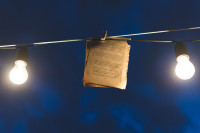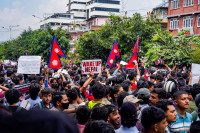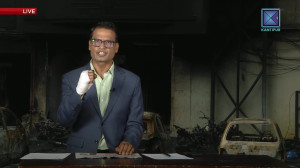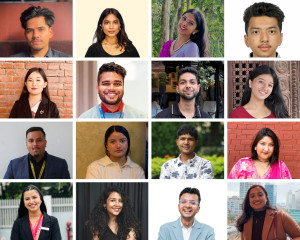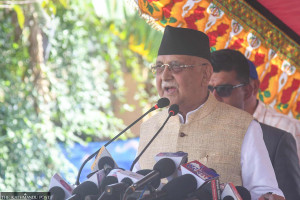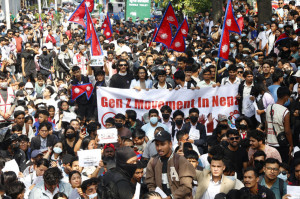Culture & Lifestyle
Samsara joins a poetry club
He looked around the table and wondered how this group of losers would transform Nepali literature.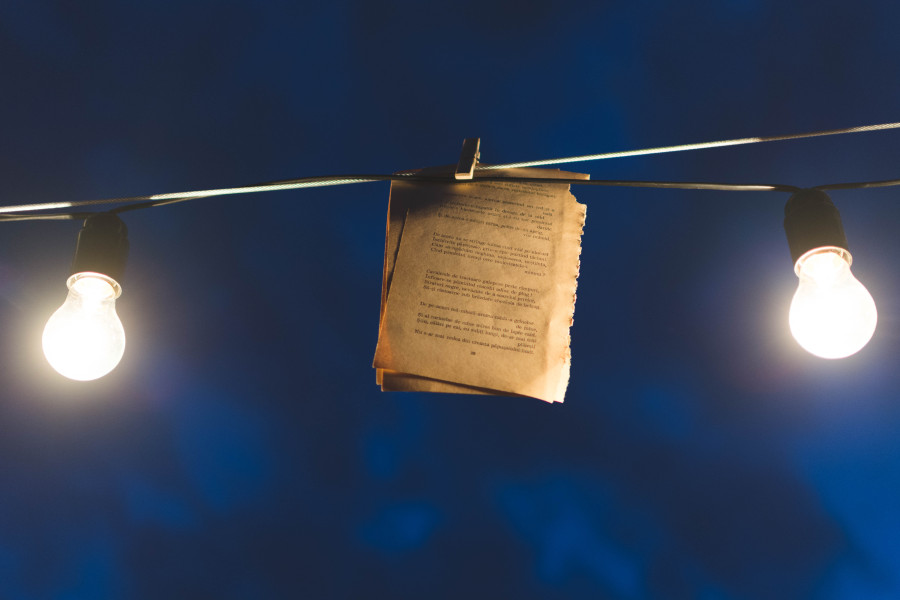
Sameen Shakya
Samsara walked up the stairs to the cafe where the Dead Poets Society was supposed to meet. He had expected a place fancier than this. The stairway was narrow and winding. The walls were yellow with cracks that could be scratched with bare fingers, revealing the white plaster beneath. A stale stench in the air was probably run-off from some restaurant kitchen nearby. Very unpoetic from the likes of it. Still, he’d committed, and he ought to stick with it.
As he made his way up, he could feel his shoes clicking on the wooden stairs and imagined what it’d be like if he fell. As his imagination clouded his reality, he heard a voice yell “Samsara” and looked up.
Four men were seated around a coffee table, staring. The one who spoke his name got up and made his way towards him. He was a short and skinny guy with a very sharp beard and wild hair who reached out his hand for a handshake, a gesture Samsara returned, though he found himself disappointed when this man’s hands dissolved in his own during the handshake. “It’s me, Amit,” he said, gestured towards the rest of the table, and introduced everyone else.
“That’s Bibek,” he pointed towards a portly guy with glasses on and wearing a grey button-up Polo shirt. Bibek got up, said hi, and immediately sat down.
“That’s Praveen,” Amit pointed to the guy sitting on Bibek’s right. Praveen was slim, though not entirely skinny, and tall. He had on a graphic T-Shirt though the design was so faded Samsara couldn’t make heads or tails about what band or artist it was supposed to be. Praveen too got up said hello but in a more relaxed manner than Bibek and sat down again.
“And last but not the least, that’s Sagar,” he pointed to the guy sitting on Praveen’s right. Sagar was a super skinny dude, even skinnier than Amit, and the most outrightly outgoing guy of the three he’d been introduced to. He got up, wearing a wide smile, and walked up to Samsara. He held out his hands as well, didn’t even wait for Samsara’s hands to reach him, as he clasped his hands, shook them on the verge of violence, with a grip that made Samsara respect him immediately. This guy’s alright, Samsara thought, and sat down.
“So,” Amit began, “We, the Dead Poet’s Society, are proud to welcome our newest member, Samsara, to the group.” Everyone turned towards Samsara and started clapping. Samsara, on the other hand, awkwardly put his head down, with an embarrassing smile swimming around his lips. “Thanks,” he managed to squeeze out. “So, what do you guys do?” he added.
“Well,” Sagar said, “The goal is simple: to shake up the foundations of literature in Nepal.” He started laughing and everyone, but Samsara, followed.
“More specifically, literature written in English by Nepali writers,” Bibek added sheepishly.
“Kinda like you. Kinda like us,” Amit said, with his hands on Samsara’s shoulders. Samsara turned to him and smiled. He looked around the table and wondered how this group of stupid losers would transform Nepali literature. He thought back on how he found out about the Dead Poet’s Society in the first place. Samsara had posted a long poem of his called ‘Death and the Maiden’ on a Facebook group that went something like this:
Death and the Maiden
I sing to you, oh airplanes
buzzing above me, you are now my muses,
Send me inspiration, send me some lines
to write and images to write upon,
Send me a story that I can dread
and turn into poems the world to see,
So I know I'm not a fool,
So I know my life's all not folly.
I bite my tongue and lick my nails,
No words are in me, naught can I write,
If naught I write, naught I live for,
Then the jump from the roof is all that's left for me.
But wait, sayeth the muse,
Close your eyes, lie on my bosom,
Hear now the horns that are fugal,
And tell the world what do you see...
I see,
A maiden on a green field
I see the nymphs dance beside her
I see she laughing and weeping with joy
I see she is beautiful and lovely and pure,
I see no dark clouds above her
I see I cannot trust this vision
I see my heart rise into my mouth
And I know that something's about to go wrong.
I hear the cloudless sky now rumbling
I hear footsteps at her back
I hear her scream her scream now muffled
I hear the nymphs trying to attack
I hear their blood drip on the fountain
The fountain by which they bathed and danced
I hear everything now go silent
As I am dragged to some place dark.
What is this you present me, oh muse?
What is this vision you make me see?
It is not finished yet, sayeth the muse.
There is still a lot to come, so just see.
Hell is a dark and frigid place
Dante already told it so I'll not tell
No more than what I see
And what I see is hell.
The maiden lies naked upon a marble slat
The dark figure beside her is doing this and that
She is scared and frightened and numb and cold
She tries to be brave and she tries to be bold
But as the figure touches her and mounts her soft skin
And closes her eyes and slides something in
She knows not else but oblivion and pain and woe-
Enough! I say, I can take no more
I charge into the figure but he taketh his scythe
And launches upon me, oh heaven his eyes
Are empty, he smiles not, his face is a hole
So vast and so hungry, I can't do but roll
Away. The maiden looks at me and cries.
Oh heaven! Oh hell! Oh humanity! Her eyes...
I wake and my face is lathered with tears
I've cried. Oh muse, what a sight
You showed me. Is it all real or not?
If only an image, then what?
If it's real, then take me back,
What happened to the maiden?
Why can't I go back?
The vision that, that disturbeth you so,
The vision I showed you a while ago,
Is you and me and me and you.
Now go tell the world, and see what they do.
I am puzzled my friend, I am truly puzzled.
I have sung you the poem, but I understand it not.
I saw the vile brutality of it all
And I see it yet, but I understand it not.
Do you? Then tell me
For I understand it not.
Understandably, not many people had commented, much less liked, the post, which had left him quite disappointed, as the poem was one he was quite proud of. So, hours later, when a message notification popped up on his phone from a guy named Amit asking about his poem, he was beyond ecstatic.
His fingers fluttered to answer, and they started talking intently about poetry. Amit told him about a poetry group he was a part of called ‘Dead Poet’s Society’ and Samsara, predictably intrigued by the name, agreed to come to a meeting.
Now, though, looking at the scene in front of him, the four men, no, boys, talking out their ass, he felt cheated. This was no Bolano story. This was just a farce. So, he made an excuse and left. Never to see any of them again.




 22.09°C Kathmandu
22.09°C Kathmandu
